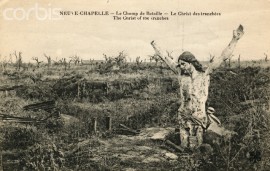
I have always found this war poem from World War I very moving. The author is “L.W.”, and I have been unable to discover his identity. The poem powerfully reminds us of how easy it is to forget Christ, He who is most important in our brief lives here on Earth.
“WE had forgotten You, or very nearly–
You did not seem to touch us very nearly–
Of course we thought about You now and then;
Especially in any time of trouble–
We knew that You were good in time of trouble–
But we are very ordinary men.
And there were always other things to think of–
There’s lots of things a man has got to think of–
His work, his home, his pleasure, and his wife;
And so we only thought of You on Sunday–
Sometimes, perhaps, not even on a Sunday–
Because there’s always lots to fill one’s life.
And, all the while, in the street or lane or byway–
In country lane, in city street, or byway–
You walked among us, and we did not see.
Your feet were bleeding as You walked our pavements–
How did we miss Your Footprints on our pavements–
Can there be other folk as blind as we?
Now we remember; over here in Flanders
(It isn’t strange to think of You in Flanders)–
This hideous warfare seems to make things clear.
We never thought about You much in England–
But now that we are far away from England–
We have no doubts, we know that You are here.
You helped us pass the jest along the trenches–
Where, in cold blood, we waited in the trenches–
You touched its ribaldry and made it fine.
You stood beside us in our pain and weakness–
We’re glad to think You understand our weakness–
Somehow it seems to help us not to whine.
We think about You kneeling in the Garden–
Ah! God! the agony of that dread Garden–
We know You prayed for us upon the Cross.
If anything could make us glad to bear it–
‘Twould he the knowledge that You willed to bear it–
Pain–death–the uttermost of human loss.
Although we forgot You–You will not forget us–
We feel so sure that You will not forget us–
But stay with us until this dream is past.
And so we ask for courage, strength, and pardon–
Especially, I think, we ask for pardon–
And that You’ll stand beside us to the last.
L.W.

Thanks for this.
You are very welcome Phillip!
‘I knew a simple soldier boy
Who grinned at life in empty joy,
Slept soundly through the lonesome dark,
And whistled early with the lark.
In winter trenches, cowed and glum,
With crumps and lice and lack of rum,
He put a bullet through his brain.
No one spoke of him again.’
You smug-faced crowds with kindling eye
Who cheer when soldier lads march by,
Sneak home and pray you’ll never know
The hell where youth and laughter go.
‘Suicide in the trenches’ by Siegfried Sassoon.
Wear a Poppy with pride. Lest We Forget.
Stand-To: Good Friday Morning
I’d been on duty from two till four.
I went and stared at the dug-out door.
Down in the frowst I heard them snore.
‘Stand to!’ Somebody grunted and swore.
Dawn was misty; the skies were still;
Larks were singing, discordant, shrill;
They seemed happy; but I felt ill.
Deep in water I splashed my way
Up the trench to our bogged front line.
Rain had fallen the whole damned night.
O Jesus, send me a wound to-day,
And I’ll believe in Your bread and wine,
And get my bloody old sins washed white!
Siegfried Sassoon
Which of course Sassoon eventually did when he joined the Catholic Church in 1957.
In Flanders Fields
By: Lieutenant Colonel John McCrae, MD (1872-1918)
Canadian Army
In Flanders Fields the poppies blow
Between the crosses row on row,
That mark our place; and in the sky
The larks, still bravely singing, fly
Scarce heard amid the guns below.
We are the Dead. Short days ago
We lived, felt dawn, saw sunset glow,
Loved and were loved, and now we lie
In Flanders fields.
Take up our quarrel with the foe:
To you from failing hands we throw
The torch; be yours to hold it high.
If ye break faith with us who die
We shall not sleep, though poppies grow
In Flanders fields.
My father used to recite “Christ in Flanders” to our family when I was growing up. He was wounded twice in France, and that`s all we knew, otherwise he never talked about the war at all. I have been trying to find out who wrote this poem, and now don`t know how Honore de Balzac could be the author, as he died in l850 yet that is what it says in one of the references. If it is “L.W.” what more do we know of him? Surely somebody can help!
Lucy Whitmell is the poet
Thank you Megan!